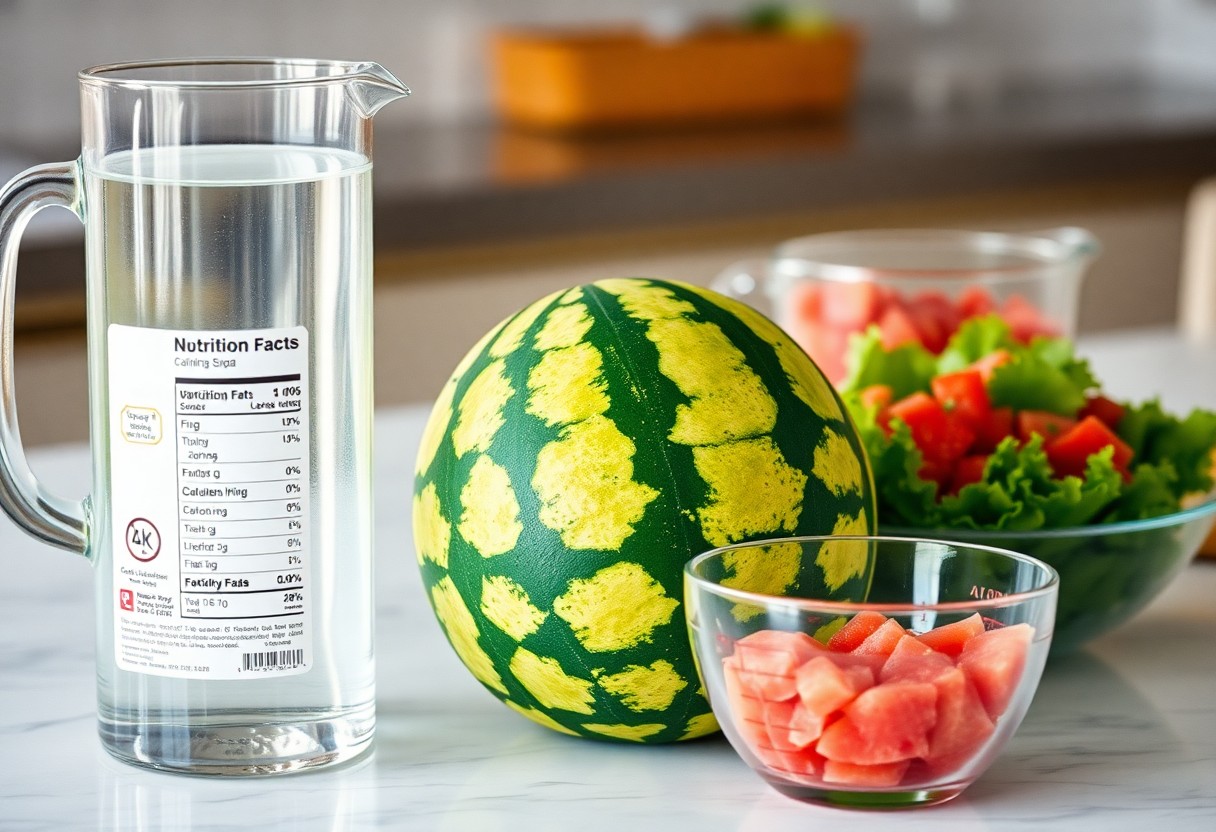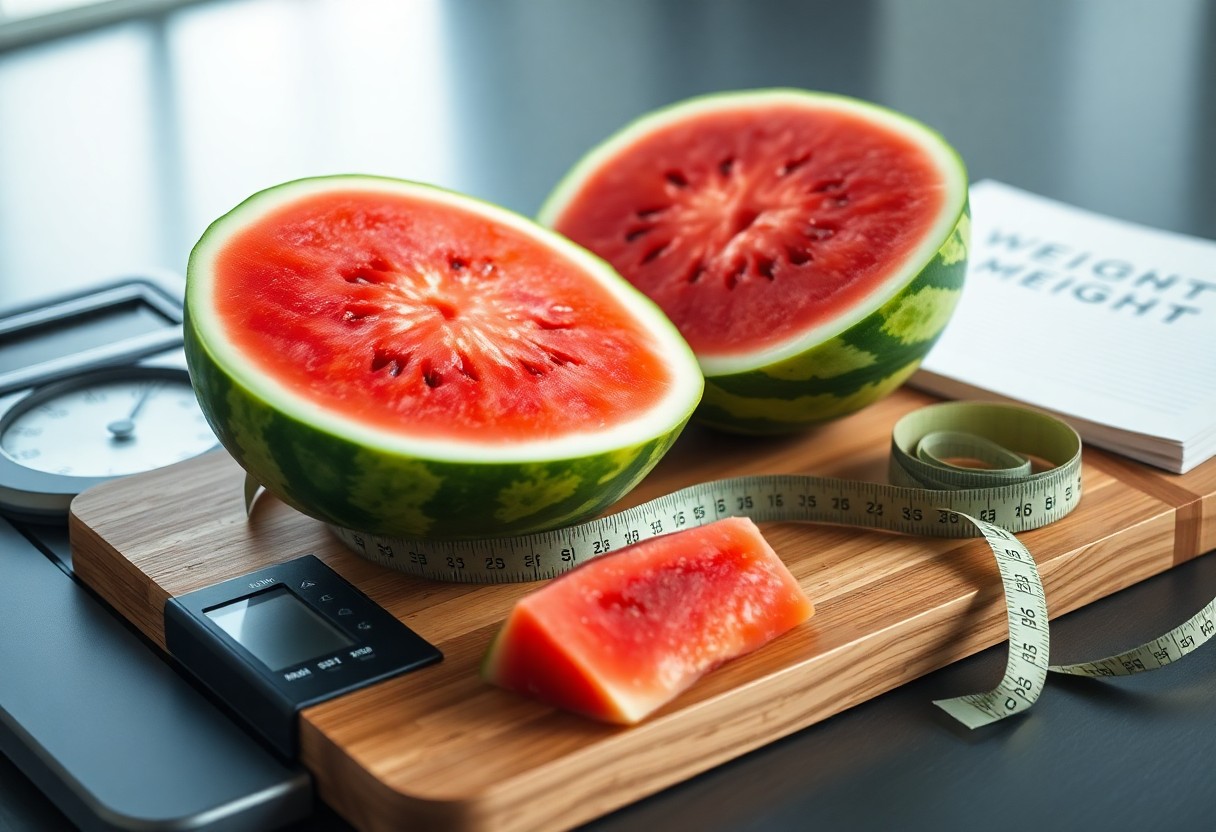Many people looking to lose weight often wonder about the nutritional content of fruits like watermelon. This refreshing fruit is not only hydrating but also low in calories, making it an attractive option for your weight loss journey. In this post, you will find details about the carbohydrate content in watermelon and whether it fits into your diet plan effectively. Understanding these aspects can help you make informed choices that align with your health goals.

Key Takeaways:
- Watermelon contains about 7.5 grams of carbohydrates per 100 grams, primarily from natural sugars.
- Low in calories and high in water content, watermelon can be a healthy choice for weight loss when consumed in moderation.
- Rich in vitamins A and C, as well as antioxidants, watermelon provides nutritional benefits beyond its carbohydrate content.
The Carb Count: Breaking Down Watermelon's Nutritional Profile
Watermelon ranks low in carbohydrates, making it a favorable option in a weight loss diet. Specifically, a one-cup serving provides around 11.6 grams of carbohydrates. Most of these carbs come from natural sugars, coupled with fiber which aids digestion. Being mostly water, watermelon contributes to hydration while keeping calorie intake low, adding to its appeal as a snack choice during weight loss journeys.
Carbohydrate Composition in Watermelon
The carbohydrate composition of watermelon consists primarily of simple sugars such as fructose and glucose. A typical serving contains about 9.5 grams of sugar, but it also includes 0.4 grams of dietary fiber, making it a sweet treat that supports satiety. This unique profile helps you enjoy its refreshing taste while managing your carb intake effectively.
Comparison with Other Fruits and Snack Options
When compared to other fruits, watermelon has a relatively low carbohydrate count, especially when placed beside bananas or grapes. For instance, a medium banana contains about 27 grams of carbs, while grapes have around 17 grams per cup. This contrast reinforces watermelon’s appeal as a suitable snack for your weight loss plan, especially during warmer months.
Comparison of Carbohydrate Content in Fruits| Fruit | Carbohydrates (grams per cup) |
| Watermelon | 11.6 |
| Banana | 27 |
| Grapes | 17 |
| Strawberries | 13 |
Opting for watermelon over higher-carb fruits not only helps you manage your overall carb intake, but also enhances your hydration levels due to its 92% water content. This hydration can promote a feeling of fullness, reducing the tendency to snack excessively on more calorie-dense options. Additionally, incorporating watermelon into your diet can satisfy sweet cravings with fewer calories, aligning perfectly with weight loss goals.
Comparison of Snack Options| Snack | Carbohydrates (grams) |
| Watermelon (1 cup) | 11.6 |
| Granola Bar | 30 |
| Potato Chips (1 oz) | 15 |
| Rice Cakes (1 cake) | 7 |
Hydration versus Energy: Watermelon's Role in Weight Loss
Watermelon stands out as a refreshing treat that contributes to hydration while being low in calories. This makes it an appealing option for those focused on weight loss. Each bite delivers not just a burst of flavor but also helps quench your thirst, allowing you to enjoy a satisfying snack without the added calories that can come from higher-calorie foods.
Caloric Density and Satiety Factors
The caloric density of watermelon is remarkably low, with about 30 calories per 100 grams. This means you can eat a generous serving without significantly contributing to your daily caloric intake. Watermelon’s high water content helps you feel full, providing that sense of satisfaction while keeping caloric consumption in check.
- Low-calorie, high-water content for effective snacking.
- Promotes satiety, reducing overall food intake.
- Rich in vitamins and antioxidants enhancing health benefits. Knowing that watermelon can help maintain a healthy weight while still indulging your sweet tooth may encourage you to incorporate it into your diet more often.
The Impact of Water Content on Appetite
The high water content in watermelon plays a significant role in controlling appetite. Foods that contain more water tend to be lower in calories and can help you feel full quicker. Eating watermelon may lead to reduced desire for additional snacks or larger portions, ultimately supporting your weight loss efforts.
Water-rich foods, like watermelon, expand in your stomach, creating a feeling of fullness that can stave off hunger longer than dry, calorie-dense alternatives. The hydrating properties may also signal to your brain that your body is satiated, promoting a sense of fullness that helps reduce overall caloric intake. Adding watermelon to your meals could be a simple yet effective strategy for managing your appetite throughout the day.
Glycemic Index: Watermelon’s Effect on Blood Sugar Levels
Watermelon has a glycemic index (GI) of approximately 72, which is considered high on the scale. However, its high water content and low carbohydrate load mean that its glycemic load (GL) is relatively low. This makes it a suitable fruit for most people, especially when consumed in moderation. For those monitoring their carbohydrate intake, incorporating watermelon can still be beneficial, as evidenced by Low-Carb Fruits: What and How Much to Eat.
Understanding Glycemic Index in Weight Management
The glycemic index measures how quickly foods raise blood sugar levels. Choosing foods with a lower GI helps maintain steady energy levels and can reduce hunger spikes, which is crucial for weight management. Watermelon's GI, while high, should be balanced with its hydration and nutrient density, allowing you to enjoy it without significant blood sugar fluctuations.
Watermelon’s Position Compared to Other Sweet Fruits
When comparing the glycemic index of watermelon to other sweet fruits, it holds a unique position. Fruits like bananas and pineapples tend to have higher GIs, while berries and cherries score lower. This means that although watermelon has a high GI, its overall impact on blood sugar may be less than that of those other sweets.
Glycemic Index Comparison of Fruits| Fruit | Glycemic Index |
|---|---|
| Watermelon | 72 |
| Banana | 51 |
| Pineapple | 66 |
| Berries | 25 |
| Cherries | 22 |
| Fruit | Carbohydrates (g per 100g) |
|---|---|
| Watermelon | 7.55 |
| Banana | 22.84 |
| Pineapple | 13.12 |
| Berries | 5.7 |
| Cherries | 16.01 |

Incorporating Watermelon into a Weight Loss Plan
Watermelon can be a beneficial addition to your weight loss plan due to its low calorie density and hydration properties. By consuming it in moderation, you can enjoy its sweetness without overshooting your daily carb intake. You might consider including watermelon in your meals or snacks, enhancing your diet with flavors while gaining nutritional benefits. For detailed Nutrition Facts and Health Benefits of Watermelon, integrating it into your routine can support your health goals.
Creative Ways to Enjoy Watermelon
Incorporate watermelon into your diet by blending it into smoothies, tossing it in salads, or using it as a refreshing salsa. Grilling watermelon can also enhance its flavor, providing a unique twist to your meals. Experimenting with different preparations can keep your meals exciting while reaping the fruit's benefits.
Balancing Watermelon with Other Nutritional Foods
To maximize watermelon’s benefits, pair it with other nutrients. Combining it with a source of protein, such as Greek yogurt or nuts, can create a well-rounded snack or meal. The protein and healthy fats help to keep you fuller for longer periods, supporting weight management objectives.
Including protein alongside watermelon not only enhances satiety but also stabilizes your blood sugar levels, preventing spikes and crashes that lead to cravings. Consider creating a watermelon salad with feta cheese and mint or topping yogurt with diced watermelon for a nutritious breakfast. By strategically combining foods, you can maintain energy levels while enjoying the refreshing taste of watermelon.
Expert Perspectives: Nutritionists Weigh In on Watermelon for Weight Loss
Nutritionists often highlight watermelon as a hydrating and low-calorie snack that can fit well into weight loss diets. It offers a sweet, satisfying option with a high water content, which can help suppress hunger. Experts agree that its fiber content, despite being modest, contributes to digestive health. For insights on watermelon’s nutritional profile, check out Is watermelon good for weight loss? - Nutrition Facts.
Common Misconceptions Debunked
Many people mistakenly believe that watermelon should be avoided due to its high sugar levels and glycemic index. In reality, the sugars in watermelon are natural and paired with its water content, making it a low-calorie option. The notion that watermelon will lead to weight gain is unfounded, as it can actually aid in hydration without contributing significantly to calorie intake.
Beneficial Nutrients Beyond Carbs
Watermelon is rich in vitamins A and C, which support skin health and immune function. Additionally, it contains antioxidants like lycopene and beta-carotene, which may help combat inflammation. The fruit also provides potassium, aiding in muscle function and hydration balance, reinforcing its status as a smart weight loss choice.
The antioxidants in watermelon, particularly lycopene, offer more than just flavor; they may reduce the risk of chronic diseases. Lycopene has been linked to heart health and could lower blood pressure. Moreover, vitamin A supports eye health while vitamin C boosts collagen production, enhancing skin elasticity. Potassium’s role in managing blood pressure further supports overall health, making watermelon a multifaceted addition to your diet. This fruit not only satisfies your sweet tooth but also enriches your nutritional intake in various ways.
Final Words
As a reminder, watermelon contains about 7.5 grams of carbohydrates per 100 grams, making it a low-carb fruit option that can fit well into your weight loss plan. Its high water content and natural sugars provide hydration and a satisfying sweetness without excessive calories. Including watermelon in your diet can help curb cravings while offering crucial vitamins and minerals. Therefore, you can enjoy this refreshing fruit guilt-free as part of your healthy eating strategy.
FAQ
Q: How many carbs are in a serving of watermelon?
A: One cup of diced watermelon contains about 11.6 grams of carbohydrates.
Q: Is watermelon a good choice for weight loss?
A: Yes, watermelon is low in calories and high in water content, making it a filling snack that can aid in weight loss.
Q: Does watermelon have any nutritional benefits?
A: Watermelon is rich in vitamins A and C, as well as antioxidants like lycopene, which can support overall health.
Q: Can eating watermelon affect blood sugar levels?
A: While watermelon has a high glycemic index, its low carbohydrate content means it has a moderate effect on blood sugar levels when consumed in moderation.
Q: How can I incorporate watermelon into my diet for weight loss?
A: Watermelon can be enjoyed as a snack, added to salads, or blended into smoothies, providing a refreshing low-calorie option.

0 Comments